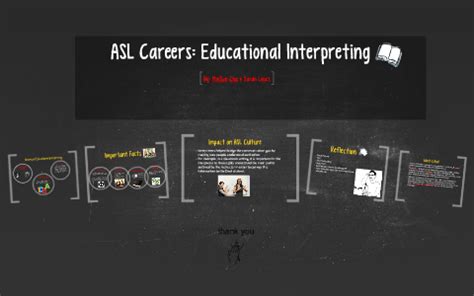Asl Careers

The American Sign Language (ASL) interpreting field offers a unique and rewarding career path for individuals passionate about language, communication, and inclusivity. ASL interpreters play a crucial role in bridging the gap between the hearing and deaf communities, ensuring effective communication and promoting accessibility. This article delves into the world of ASL careers, exploring the qualifications, skills, and opportunities available in this growing profession.
The Role of ASL Interpreters

ASL interpreters are skilled professionals who facilitate communication between individuals who use ASL and those who do not. They provide accurate and culturally sensitive interpretation services in a wide range of settings, including educational institutions, healthcare facilities, legal proceedings, and community events.
Interpreters not only translate the spoken word into sign language but also convey the nuances, emotions, and cultural context of the message. This requires a deep understanding of both ASL and the English language, as well as the ability to think and act quickly to ensure smooth and seamless communication.
Qualifications and Education

Becoming an ASL interpreter typically involves a combination of education, training, and certification. While specific requirements may vary by region and employer, here are some common steps to pursue an ASL interpreting career:
Obtain a Degree
Many ASL interpreters hold a bachelor’s degree in interpreting, deaf studies, or a related field. These programs provide a strong foundation in ASL, deaf culture, and interpreting techniques. Courses often cover topics such as ASL linguistics, interpreting theory, ethics, and professional practices.
Some institutions also offer specialized master's programs in ASL interpreting, which can further enhance one's skills and knowledge in the field.
Gain Experience
Practical experience is crucial in developing interpreting skills and gaining familiarity with various settings. Many aspiring interpreters seek out volunteer opportunities, internships, or part-time work to build their portfolio and network within the deaf community.
Mentorship programs and interpreter training workshops can also provide valuable guidance and hands-on practice.
Certification
Certification is often a significant milestone in an interpreter’s career. In the United States, the Registry of Interpreters for the Deaf (RID) offers various certifications, including the National Interpreter Certification (NIC) and Certified Deaf Interpreter (CDI) credentials. These certifications demonstrate an interpreter’s proficiency and adherence to professional standards.
RID certifications require passing rigorous exams that assess interpreting skills, knowledge of deaf culture, and ethical practices.
Skills and Competencies
Successful ASL interpreters possess a unique skill set that combines linguistic abilities, cultural understanding, and professional qualities. Here are some key skills and competencies essential for this profession:
- Fluency in ASL: Interpreters must be highly proficient in ASL, including grammar, vocabulary, and non-manual markers. This fluency allows them to accurately interpret complex ideas and emotions.
- Bilingualism: ASL interpreters are typically bilingual, possessing strong skills in both ASL and English. This enables them to bridge the language gap effectively.
- Cultural Competence: Understanding deaf culture and its unique perspectives is vital. Interpreters should be sensitive to cultural nuances and promote cultural humility in their work.
- Interpreting Techniques: Knowledge of various interpreting techniques, such as simultaneous, consecutive, and sight translation, is essential. Interpreters must choose the appropriate technique based on the context and ensure accurate and clear communication.
- Professionalism: Interpreters must maintain strict confidentiality, adhere to ethical guidelines, and demonstrate professionalism in all interactions. This includes being punctual, reliable, and adaptable to different situations.
- Critical Thinking: Quick thinking and problem-solving skills are crucial in interpreting. Interpreters often face challenging situations, such as technical jargon or emotional content, and must find creative solutions to convey the message accurately.
Career Opportunities and Specializations
The demand for ASL interpreters is growing, and the field offers a variety of career paths and specializations. Here are some areas where ASL interpreters can find rewarding opportunities:
Educational Settings
ASL interpreters play a vital role in educational institutions, supporting deaf and hard-of-hearing students in their academic pursuits. They facilitate communication in classrooms, lectures, and student interactions, ensuring equal access to education.
Interpreters may work in schools, colleges, or universities, providing services for deaf students or facilitating sign language learning programs for hearing students.
Healthcare
Healthcare facilities rely on ASL interpreters to ensure effective communication between healthcare providers and deaf patients. Interpreters facilitate discussions about medical diagnoses, treatments, and patient care, promoting better healthcare outcomes and patient satisfaction.
Interpreters may specialize in specific medical fields, such as mental health, pediatrics, or geriatrics, requiring additional training and expertise.
Legal and Judicial Settings
ASL interpreters are crucial in legal proceedings, ensuring deaf individuals have access to justice and can fully participate in the legal system. They interpret during court hearings, depositions, and legal consultations, maintaining confidentiality and accuracy.
Legal interpreting requires a strong understanding of legal terminology and the ability to convey complex legal concepts in ASL.
Community Events and Media
Interpreters contribute to the accessibility of community events, conferences, and public gatherings. They ensure that deaf individuals can engage fully in civic life, participate in political processes, and access information and entertainment.
In the media industry, interpreters provide sign language interpretation for television programs, films, and online content, making media more inclusive and accessible.
Freelance and Business Interpreting
Many ASL interpreters work as freelancers, offering their services to various clients and organizations. This allows for flexibility and the opportunity to work in diverse settings, from business meetings to social events.
Some interpreters specialize in business interpreting, facilitating communication in corporate settings, negotiations, and international business interactions.
The Impact of Technology

Advancements in technology have had a significant impact on the field of ASL interpreting. Video remote interpreting (VRI) and over-the-phone interpreting (OPI) services have expanded access to interpreting services, especially in remote or rural areas.
While technology offers convenience, face-to-face interpreting remains invaluable for complex or sensitive situations. Interpreters must adapt to these technological advancements while maintaining the human connection and cultural sensitivity inherent in their work.
Future Outlook and Challenges
The demand for ASL interpreters is expected to grow as awareness and acceptance of deaf culture and language continue to increase. However, the field also faces challenges, including a shortage of qualified interpreters and the need for ongoing professional development.
Advocacy for better training programs, mentorship opportunities, and improved working conditions is essential to address these challenges and ensure a sustainable future for the ASL interpreting profession.
Conclusion
A career in ASL interpreting offers a unique and meaningful path for individuals passionate about language, communication, and social justice. With the right qualifications, skills, and dedication, ASL interpreters can make a significant impact on the lives of deaf individuals, fostering inclusivity and equal access in various aspects of society.
What is the typical salary range for ASL interpreters?
+Salary ranges can vary depending on experience, specialization, and geographic location. According to recent data, the median annual wage for interpreters and translators, including ASL interpreters, is around $52,000. However, experienced interpreters with advanced certifications and specializations can earn significantly more.
Are there opportunities for advancement in the field of ASL interpreting?
+Yes, there are opportunities for advancement within the field. Experienced interpreters can pursue leadership roles, such as becoming interpreter supervisors, mentors, or educators. They may also specialize in specific domains, such as legal or medical interpreting, which often come with higher salaries and increased responsibility.
How can I find interpreting jobs and build a network in the ASL community?
+Networking is crucial in the interpreting field. Join professional organizations like the Registry of Interpreters for the Deaf (RID) and attend conferences and workshops to connect with colleagues. Utilize online platforms and job boards specifically designed for interpreters, and consider reaching out to local deaf organizations for potential opportunities.



